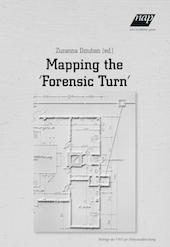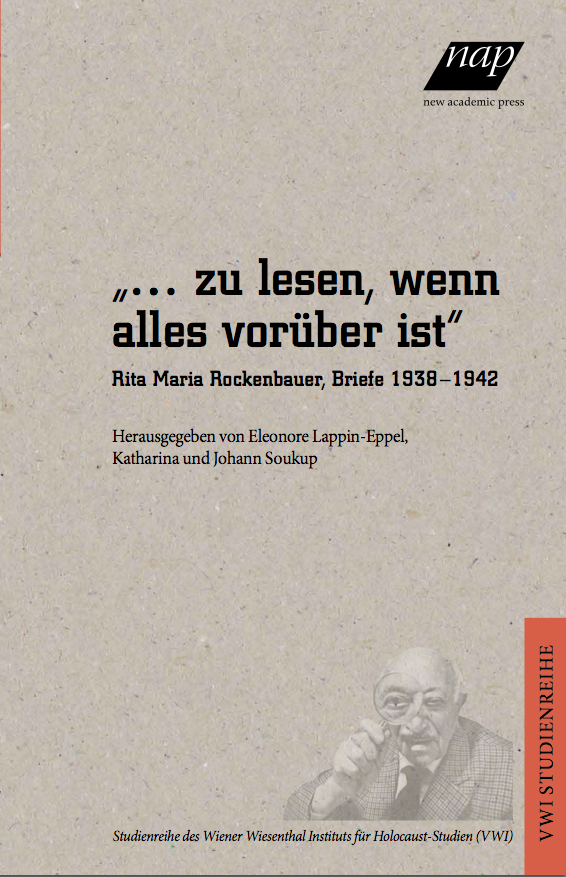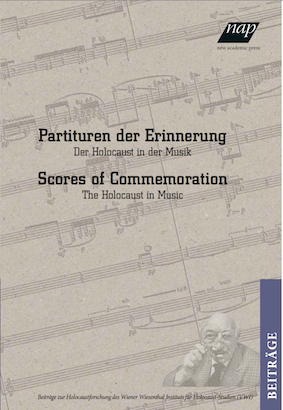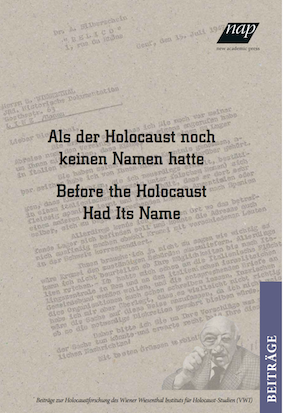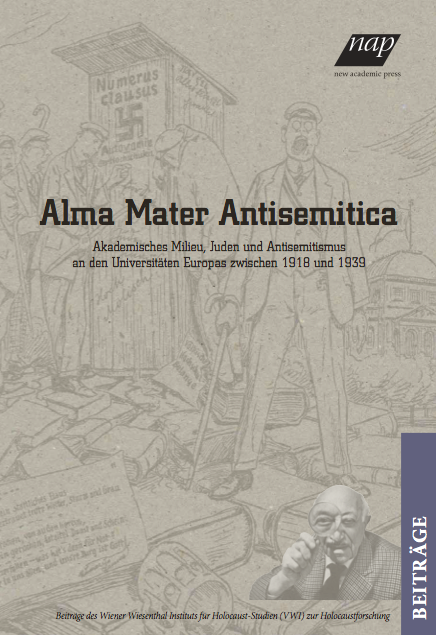 In June 2017, the Vienna Wiesenthal Institute (VWI) organised a joint workshop in Vienna with the International Research Centre for Cultural Sciences (IFK) on Hannah Arendt. This workshop aimed to look more closely at Arendt’s understanding of judgement and the constant tension in her thought between universalism and particularism. This also serves as the point of departure for this essay. I would like to start with a couple of questions which were not only of interest for Hannah Arendt but for all scholars dealing with issues of genocide and mass death and how to judge it: Are Nazi murderers just a bunch of criminals? Can a legal system be the appropriate tool or its courts the venue for dealing with the traumas of past atrocities, the legacy of the Holocaust, or the unprecedented suffering of millions of victims? What does that do to our faculty of judgement which, of course, is not only the formal decision given by a court of law, but also our capacity to give an informed opinion and our capacity to cross the bridge from the particular to the universal and back?
In June 2017, the Vienna Wiesenthal Institute (VWI) organised a joint workshop in Vienna with the International Research Centre for Cultural Sciences (IFK) on Hannah Arendt. This workshop aimed to look more closely at Arendt’s understanding of judgement and the constant tension in her thought between universalism and particularism. This also serves as the point of departure for this essay. I would like to start with a couple of questions which were not only of interest for Hannah Arendt but for all scholars dealing with issues of genocide and mass death and how to judge it: Are Nazi murderers just a bunch of criminals? Can a legal system be the appropriate tool or its courts the venue for dealing with the traumas of past atrocities, the legacy of the Holocaust, or the unprecedented suffering of millions of victims? What does that do to our faculty of judgement which, of course, is not only the formal decision given by a court of law, but also our capacity to give an informed opinion and our capacity to cross the bridge from the particular to the universal and back?
Editorial
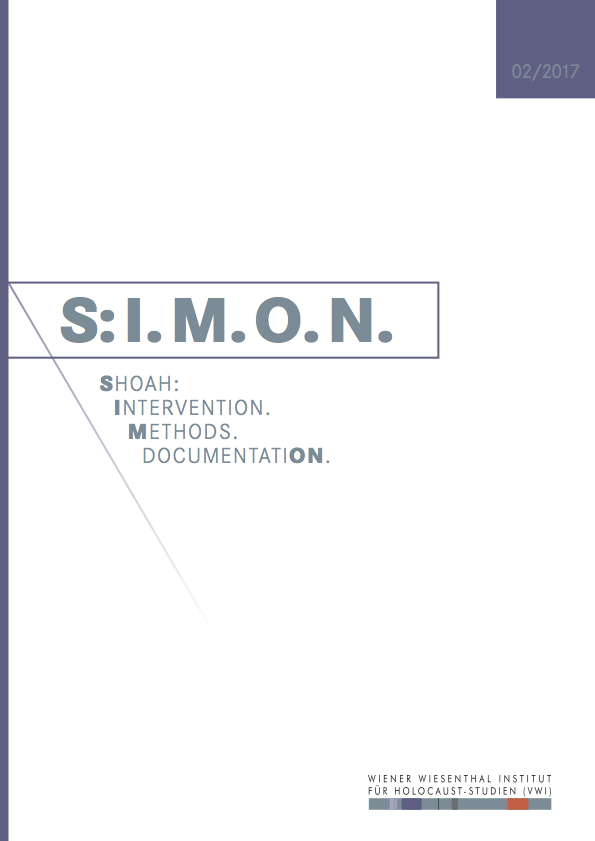 S:I.M.O.N. is an e-journal of the Vienna Wiesenthal Institute for Holocaust Studies (VWI). It appears twice a year in English and German language. S:I.M.O.N. aims at both a transnational and comparative history of the Holocaust and Jewish Studies in Central and Eastern Europe within the broader contexts of the European history of the 20th and 21st century, including its prehistory, consequences and legacies as well as the history of memory.
S:I.M.O.N. is an e-journal of the Vienna Wiesenthal Institute for Holocaust Studies (VWI). It appears twice a year in English and German language. S:I.M.O.N. aims at both a transnational and comparative history of the Holocaust and Jewish Studies in Central and Eastern Europe within the broader contexts of the European history of the 20th and 21st century, including its prehistory, consequences and legacies as well as the history of memory.
S:I.M.O.N. serves as a forum for discussion of various methodological approaches. The journal especially wishes to strengthen the exchange between researchers from different scientific communities and to integrate both the Jewish history and the history of the Holocaust into the different “national” narratives. It also lays a special emphasis on memory studies and the analysis of politics of memory. S:I.M.O.N. uses a double-blind review system, which means that both the reviewer’s and the author’s identities are concealed from each other hroughout the review process.
Shoah: The journal deals with the history of the Shoah from multidisciplinary, transnational and comparative perspectives. It seeks to integrate studies on Jews as well as on other groups of victims of the Holocaust, especially on Roma, and of so far less researched regions of (East) Central and (South) Eastern Europe.
Intervention. The journal reports on research projects and their transmission into public events. It also informs about current educational and remembrance programs.
Methods. The journal serves as a forum for the discussion of methodological approaches as, for instance, the everyday history, oral history, gender history, the history of violence, anti-Semitism and racism and the theory of memory and memory politics.
DocumentatiON. The journal contributes to critical approaches on using and interpreting archival materials in the 21st century.
Download the current issue S:I.M.O.N. 2017/2.
Articles
Sławomir Kapralski
The Genocide of Roma and Sinti and Their Political Movement from the Perspective of Social Trauma Theory
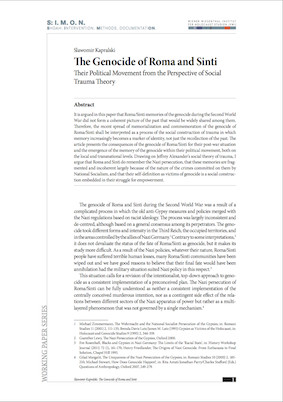 It is argued in this paper that Roma and Sinti memories of the genocide during the Second World War did not form a coherent picture of the past that would be widely shared among them. Therefore, the recent spread of memorialization and commemoration of the genocide of Roma and Sinti shall be interpreted as a process of the social construction of trauma in which memory increasingly becomes a marker of identity, not just the recollection of the past. The article presents the consequences of the genocide of Roma and Sinti for their post-war situation and the emergence of the memory of the genocide within their political movement, both on the local and transnational levels. Drawing on Jeffrey Alexander’s social theory of trauma, I argue that Roma and Sinti do remember the Nazi persecution, that these memories are fragmented and incoherent largely because of the nature of the crimes committed on them by National Socialism, and that their self-definition as victims of genocide is a social construction embedded in their struggle for empowerment.
It is argued in this paper that Roma and Sinti memories of the genocide during the Second World War did not form a coherent picture of the past that would be widely shared among them. Therefore, the recent spread of memorialization and commemoration of the genocide of Roma and Sinti shall be interpreted as a process of the social construction of trauma in which memory increasingly becomes a marker of identity, not just the recollection of the past. The article presents the consequences of the genocide of Roma and Sinti for their post-war situation and the emergence of the memory of the genocide within their political movement, both on the local and transnational levels. Drawing on Jeffrey Alexander’s social theory of trauma, I argue that Roma and Sinti do remember the Nazi persecution, that these memories are fragmented and incoherent largely because of the nature of the crimes committed on them by National Socialism, and that their self-definition as victims of genocide is a social construction embedded in their struggle for empowerment.
SWL-Reader
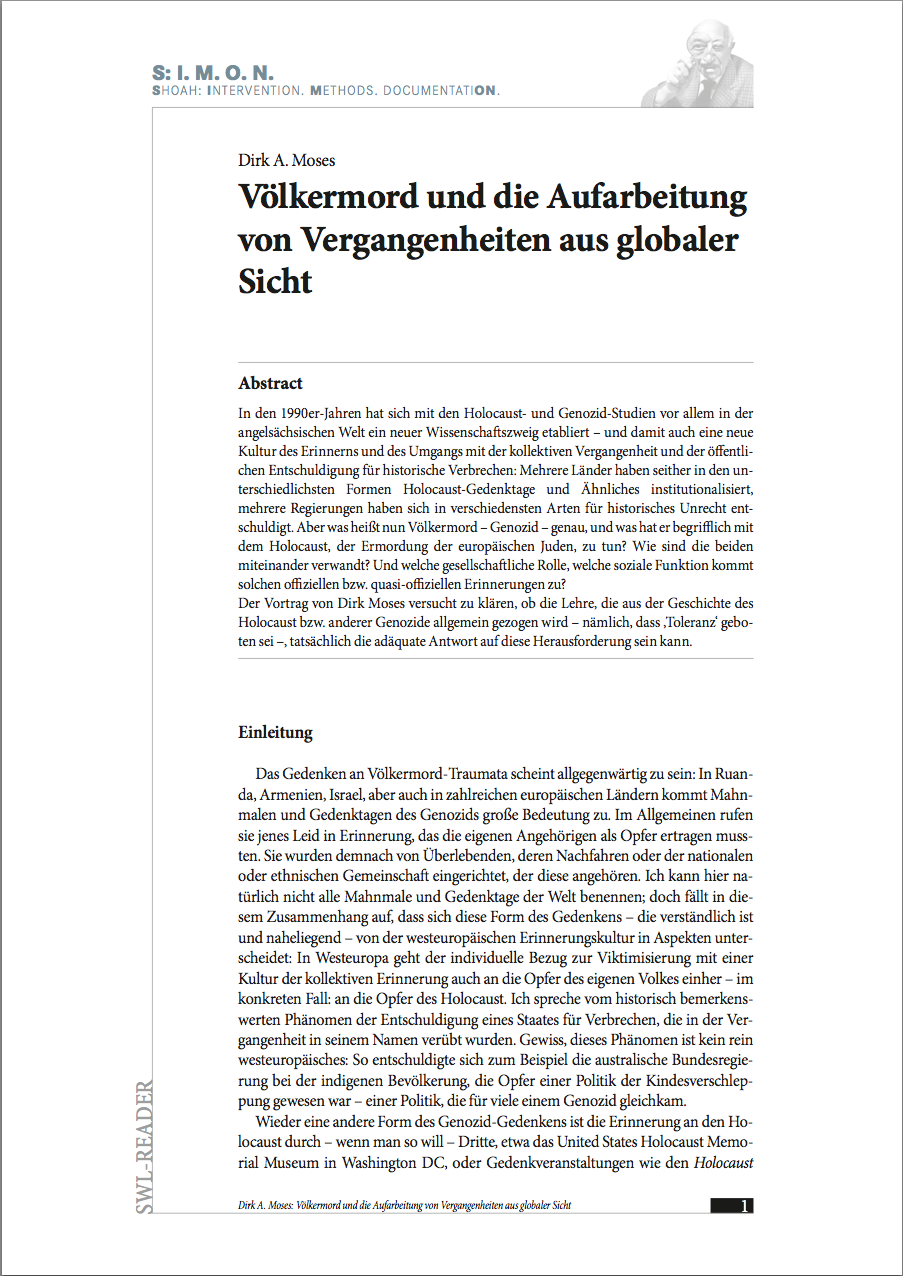 Holocaust and Genocide Studies emerged as a new discipline during the 1990s, particularly so in the Anglo-Saxon world. This development also established a new culture of remembrance and treatment of the collective past and public apologies for historical crimes. Since then, several countries have institutionalized Holocaust memorial days and similar institutions in a range of formats, several governments have apologized for historical injustices in various manners. Yet, there remains the question of a precise definition of a genocide – and in what way the term is connected to the Holocaust, the murder of the European Jews. How are these two related? What is the social function of such official or semi-official remembrances, and what is their role in society?
Holocaust and Genocide Studies emerged as a new discipline during the 1990s, particularly so in the Anglo-Saxon world. This development also established a new culture of remembrance and treatment of the collective past and public apologies for historical crimes. Since then, several countries have institutionalized Holocaust memorial days and similar institutions in a range of formats, several governments have apologized for historical injustices in various manners. Yet, there remains the question of a precise definition of a genocide – and in what way the term is connected to the Holocaust, the murder of the European Jews. How are these two related? What is the social function of such official or semi-official remembrances, and what is their role in society?
In his lecture, Dirk Moses endeavoured to clarify whether the insights gained from the history of the Holocaust and other genocides in general – namely, the imperative of 'tolerance' – really does provide an adequate answer to this challenge.
Events
Miloslav Szabó
Ein ‚antislowakischer' Oscar-Film? Zur Darstellung des Holocaust im tschechoslowakischen Film Obchod na korze
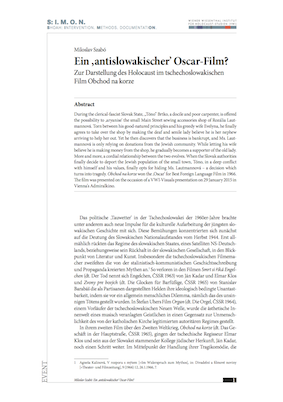 During the clerical-fascist Slovak State, "Tóno" Brtko, a docile and poor carpenter, is offered the possibility to 'aryanise' the small Main Street sewing accessories shop of Rozália Lautmannová. Torn between his good-natured principles and his greedy wife Evelyna, he finally agrees to take over the shop by making the deaf and senile lady believe he is her nephew arriving to help her out. Yet he then discovers that the business is bankrupt, and Ms. Lautmannová is only relying on donations from the Jewish community. While letting his wife believe he is making money from the shop, he gradually becomes a supporter of the old lady. More and more, a cordial relationship between the two evolves. When the Slovak authorities finally decide to deport the Jewish population of the small town, Tóno, in a deep conflict with himself and his values, finally opts for hiding Ms. Lautmannová – a decision which turns into tragedy. Obchod na korze won the 'Oscar' for Best Foreign Language Film in 1966. The film was presented on the occasion of a VWI-Visuals presentation on 29 January 2015 in Vienna's Admiralkino.
During the clerical-fascist Slovak State, "Tóno" Brtko, a docile and poor carpenter, is offered the possibility to 'aryanise' the small Main Street sewing accessories shop of Rozália Lautmannová. Torn between his good-natured principles and his greedy wife Evelyna, he finally agrees to take over the shop by making the deaf and senile lady believe he is her nephew arriving to help her out. Yet he then discovers that the business is bankrupt, and Ms. Lautmannová is only relying on donations from the Jewish community. While letting his wife believe he is making money from the shop, he gradually becomes a supporter of the old lady. More and more, a cordial relationship between the two evolves. When the Slovak authorities finally decide to deport the Jewish population of the small town, Tóno, in a deep conflict with himself and his values, finally opts for hiding Ms. Lautmannová – a decision which turns into tragedy. Obchod na korze won the 'Oscar' for Best Foreign Language Film in 1966. The film was presented on the occasion of a VWI-Visuals presentation on 29 January 2015 in Vienna's Admiralkino.
Natan Sznaider: The Jewish Judgement of Hannah Arendt
„... zu lesen, wenn alles vorüber ist“
Rita Maria Rockenbauer, Briefe 1938 –1942
Wien 2014
Partituren der Erinnerung.
Der Holocaust in der Musik
Scores of Commemoration.
The Holocaust in Music
Wien 2015
Before the Holocaust Had Its Name. Early Confrontations of the Nazi Mass Murder of the Jews
Wien 2016
Akademisches Milieu, Juden und Antisemitismus an den Universitäten Europas zwischen 1918 und 1939
Academic Milieu, Jews and Antisemitism at European Universities between 1918 and 1939
Wien 2016


